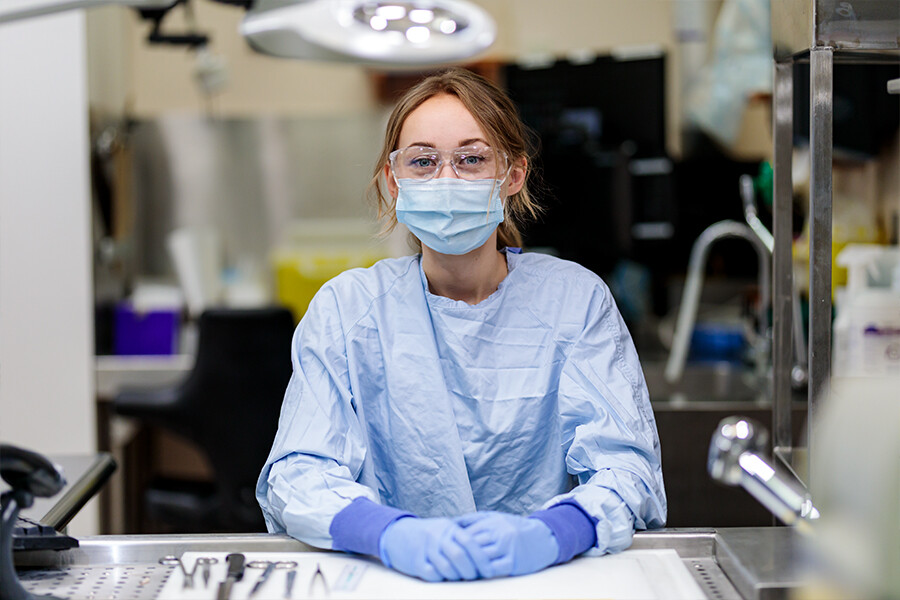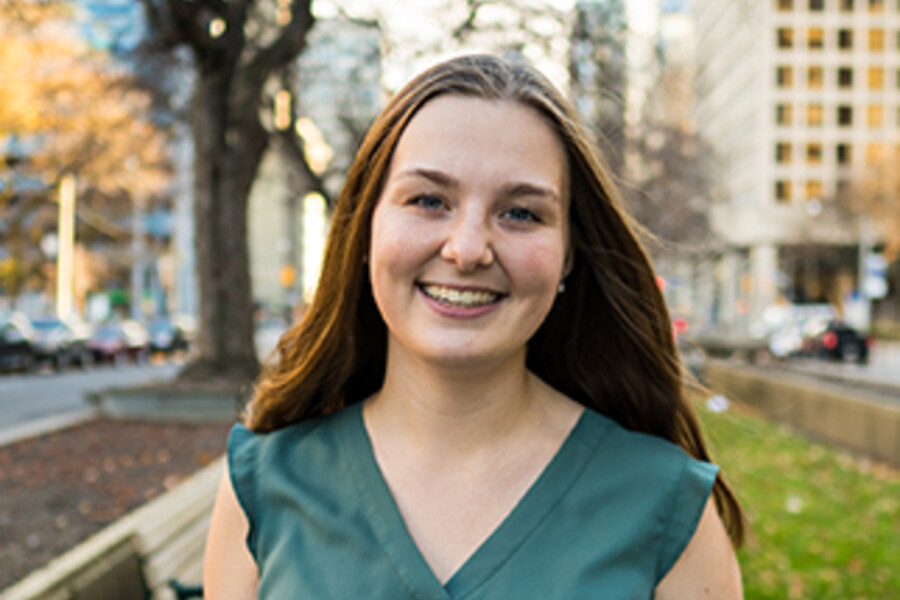
Main Second Level Navigation
- Research stream programs: prospective students
- Research stream programs: current students
- Master of Health Science (MHSc) in Laboratory Medicine
- Master of Science in Applied Computing (MScAC) Artificial Intelligence in Healthcare
- Collaborative Specialization in Musculoskeletal Sciences (CSMS)
- Master of Health Science (MHSc) in Translational Research
- Student Union: CLAMPS
Breadcrumbs
- Home
- Graduate
- Master of Health Science (MHSc) in Laboratory Medicine
- Pathologists' Assistant field
Pathologists' Assistant field
If you graduate from our program, you will be eligible to take the Canadian Certification Council of Pathologists’ Assistants (CCCPA) certification exam.
This program is fully accredited with the National Accreditation Agency for Clinical Laboratory Sciences (NAACLS), and you will be eligible to take the American Society of Clinical Pathology Pathologists’ Assistant (ASCP(PA)) certification exam upon graduation.
Program mission statement
The University of Toronto’s Master of Health Science degree in Laboratory Medicine - Pathologists’ Assistant Field - is committed to deliver an excellent professional graduate training program for health care learners that graduates highly qualified Pathologists’ Assistant professionals.
Student outcomes
2020 - 2021
We accepted our first students in the fall of 2020 so there is no graduation data. All completed the program (0% attrition).
2022 cohort
- Graduation rate: 100%
- Attrition rate: 0%
- Employment rate: 100%
- American Society for Clinical Pathology (ASCP(PA)) passing rate: no attempt
- Canadian Association of Pathologists (CCCPA) passing rate: 100%
2023 cohort
- Graduation rate: 100%
- Attrition rate: 0%
- Employment rate: 100%
- American Society for Clinical Pathology (ASCP(PA)) passing rate: 100%
- Canadian Association of Pathologists (CCCPA) passing rate: 100%
2024 cohort
- Graduation rate: 75%
- Attrition rate: 25%
- Employment rate: 100%
- American Society for Clinical Pathology (ASCP(PA)) passing rate: no attempt
- Canadian Association of Pathologists (CCCPA) passing rate: no attempt
2025 cohort
- Graduation rate: 100%
- Attrition rate: 0%
- Employment rate: 100%
- American Society for Clinical Pathology (ASCP(PA)) passing rate: no attempt
- Canadian Association of Pathologists (CCCPA) passing rate: no attempt
What is a Pathologists' Assistant?
A Pathologists’ Assistant is a highly trained healthcare professional who provides various services in surgical and autopsy pathology under the direction and supervision of a certified pathologist.
You will typically be involved in:
- preparing and examining surgical pathology specimens
- performing postmortem examinations
- laboratory operations (regulatory, quality improvement, management activities, education, and research).
You will often work in a hospital, Forensic Services office, or other laboratory in a private or university setting.
Join our mailing list to hear more about the MHSc in Laboratory Medicine
Program learning objectives
Upon graduation, you will possess the fundamental basic and clinical knowledge and practical and professional competencies required to practice as a Pathologists’ Assistant. Find out more about the learning objectives.
Essential skills
In addition to demonstrating academic aptitudes in the relevant subject areas, you must also possess the essential skills for the Pathologists' Assistant profession listed below. These skills are essential to apply your knowledge effectively in various curricular components, particularly during your practicum rotation courses. As the MHSc Program cannot independently verify that you possess these skills, you are expected to review these skills and self-reflect on your ability to meet these requirements prior to proceeding with an application or accepting an offer of admission.
1. Observational skills
- Demonstrate high attention to detail.
- Be able to identify and describe different colours, shapes, odours, and textures, accurately and completely.
2. Communication skills
- Be fluent in the English language used in medical settings.
- Correctly interpret and record information.
- Communicate effectively with other members of the healthcare team.
3. Sensory and motor skills
- Safely use sharp tools to perform dissections of human cadavers, entire or part of human organs and small tissue samples.
- Manoeuvre and transfer cadavers and specimens.
- Freely move in spaces between benches and lab hallways.
4. Analytical skills
- Be able to recall, analyze, integrate, synthesize and apply information accurately and effectively for problem solving and decision making.
- Comprehend 3-D spatial relationships of anatomic structures, and perform measurements and mathematical calculations.
5. Social and behavioral skills
Complete tasks effectively in a dynamic, high-stress environment that include frequent interruptions, noise and distractions.
- Behave in a respectful and collaborative manner towards other members of the healthcare team.
- Be able to critically self-evaluate, accept constructive criticism, and take corrective measures.
- Be flexible and adaptable in changing environments and be able to function in the face of uncertainties.
- Demonstrate sensitivity toward patients, and respect their privacy.
Q&A with Katie Ford: Pathologists’ Assistant in training

Pathologists’ Assistants: playing a key role in patient care

What and how you will learn
You will complete 9.5 full course equivalents (FCE) over two years.
In your first year, you will learn core academic competencies required to succeed in the field.
In the summer of year one, you will begin practicum rotations at hospital and laboratory sites across the Toronto area. These rotations are usually six weeks in length and will be at:
- The Hospital for Sick Children
- Lakeridge Health
- Mackenzie Health
- Mount Sinai Hospital
- North York General Hospital (currently on hold)
- Ontario Forensic Pathology Service (OFPS)
- Unity Health Toronto
- Sunnybrook Health Sciences Centre
- The University Health Network
- Trillium Health Partners
In your second year, you continue the practicum rotations, with a weekly academic half day, and work on your Capstone Research Project throughout the year.
Practicum rotation courses
During the practicum rotation courses, you are expected to attend clinical rotations on Monday to Thursdays, 8 am to 4 pm (or 8 hours), with typically 1 hour break time in total per day.
All the skills listed above under 'Essential skills', as well as the extensive knowledge gained during the course of the program, will be necessary in order to succeed these courses. Please refer to Course Overview for detailed syllabi.
Due to the nature of the work, there is a risk of exposure to blood- and air-borne illnesses as well as to various chemical solutions, radioactive materials and other hazardous substances used in the laboratory. You should carefully review the Safety Policy for all safety-related information.
Core courses
You will complete core courses, which all Pathologists' Assistant and Clinical Embryology students take. These include topics such as:
- Cell and Molecular Biology
- Biomedical Research Methods
- Clinical Laboratory Management
- Biomedical Ethics
- Biostatistics
Pathologists' Assistant specific courses
You will also take courses specific to your field, which include:
- Basic Principles in Human Pathobiology and Pathophysiology
- Anatomy and Pathology of Organ Systems
- Advanced Anatomy Dissection
- Practicums in Surgical Pathology, Autopsy Pathology and in Forensic Pathology
- Science of Biobanking
See Courses overview for full details on the courses.
Pathologists' Assistant Bootcamp: a collaborative effort across Toronto hospitals

Accessibility
The program is committed to integrate student with disabilities into the University and pathology communities and the above list of essential skills should not discourage students with disabilities from applying. Those who anticipate they will require disability-related accommodation must notify University of Toronto’s Accessibility Services, provide appropriate documentation for review, and seek relevant recommendations.
Where a student has a disability, the University will assess the needs of that student and whether those needs can be reasonably met without compromising patient care and safety. The accommodation will be determined on a case-by-case basis guided by the recommendations of Accessibility Services, who will act as the student's advocate, as well as recommendations of relevant individuals in the MHSc program.
All students are required to demonstrate the knowledge, and perform the essential skills listed above, independently and in time constrained situations, with or without accommodations. Please note that all students are required to achieve passing standards in all course/program requirements. Students with disabilities should inform the programs of their needs for accommodation and to register with Accessibility Service in a timely fashion to ensure that they receive the appropriate accommodations to meet these standards.
Contacts for the Pathologists' Assistant field
See Meet the Team for contacts.
National Accreditation Agency for Clinical Laboratory Sciences (NAACLS)
You can contact the NAACLS at:
- 5600 N. River Rd, Suite 720 Rosemont IL 60018-5119
- Phone number: 773.714.8880
- Fax number: 773.714.8886
- Email: info@naacls.org
